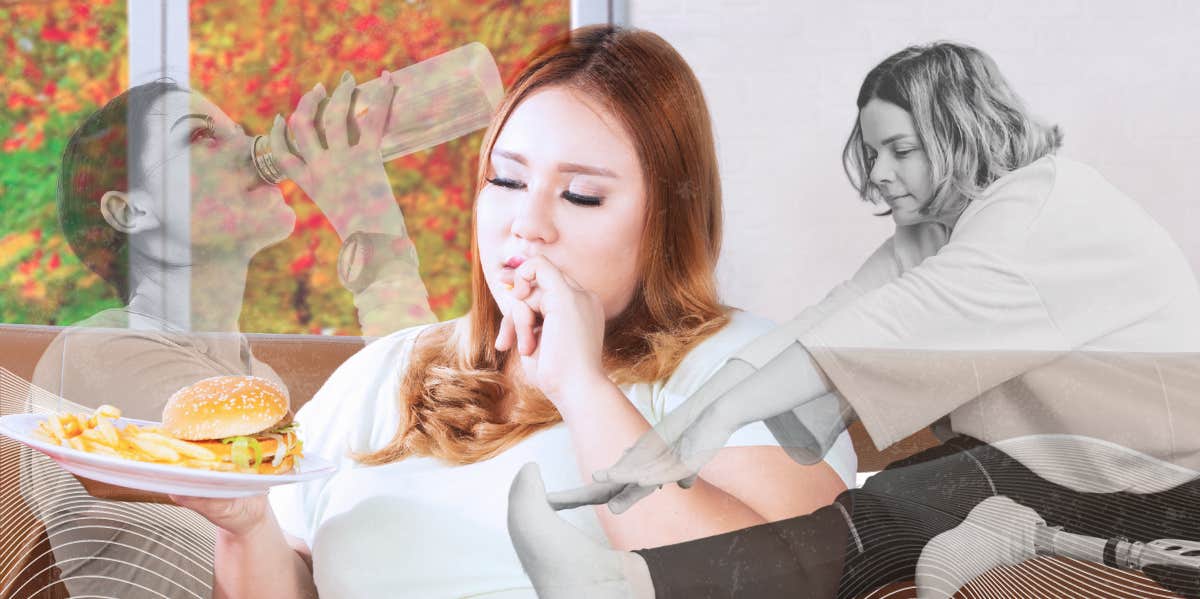5 Worst Health Mistakes You Make, According To Experts
Plus, how to fix them.
 Sergey Nivens | Creativa Images | Canva / Vlada Karpovich | Pexels
Sergey Nivens | Creativa Images | Canva / Vlada Karpovich | Pexels By Monica Beyer
Habits are hard to change. We get that. But if your habits are detrimental to your health, you have even more reason to change them. But what can you do?
Thankfully, there are a few tips and tricks that can help you get through the struggle of sitting on your can too much or not drinking enough water.
We consulted with several experts to find out if there's any way to change our bad health habits, and here's what they had to say.
1. Sitting too much
The problem: Sitting down on your tush for hours at a time is bad for your health, and a 2017 study published in the Annals of Internal Medicine shows it can actually kill you — yes, even if you exercise. Of course, this is a hard habit to break even if you want to, as many of us spend the day chained to a desk or in another sedentary job.
The solution: Physical therapist Jasmine Marcus says you can use your phone — yes, the one you play Candy Crush on when you're sitting on the toilet. She suggests setting reminders for every 30 to 60 minutes to get up and move around, which is not only good for your health but can help keep you mentally alert as well. "You can also enlist a friendly coworker to remind you both to get up at work every so often or have a family member bug you to get off the couch when you're at home," she says.
2. Not drinking enough water
The problem: Water helps a ton of your body's systems normally work — such as regulating your temperature, lubricating, and cushioning joints, and protecting your spinal cord and other sensitive tissues — and also helps rid your body of wastes. So while we know water is essential for good health, it's hard to pound enough water every day.
The solution: Courtney Meidenbauer is a registered dietitian and nutritionist and the state media representative for the Wisconsin Academy of Nutrition and Dietetics, and she suggests keeping a water bottle on hand at all times — so there is none of that "out of sight, out of mind" business going on, as it serves as a visual reminder to drink water. Also, she says she carries a big bottle. "I found a larger water bottle also means less refilling, so that reduces another barrier to not drinking enough water," she says.
Additionally, registered dietician and nutritionist Jeanette Kimszal says you can boost your fluid intake by incorporating more water-containing foods in your diet. These include grapefruits, oranges, apples, pears, cucumber, celery, spinach, iceberg lettuce, bell peppers, green cabbage, cauliflower, eggplant, red cabbage, broccoli, carrots, and green peas, she says.
3. Biting your nails
The problem: Nail-biting is a habit that can develop in childhood, but for some of us, it can hang on past adolescence. It can damage teeth and expose the biter to a hell of a lot more germs than non-nail-biters and can be psychologically or socially stressful.
The solution: Dr. Natalie Dattilo, a licensed clinical psychologist, says that if you're a nail-biter, examine your triggers — for example, do you tend to chomp them while you're on your phone, while driving, or while feeling anxious? Instead, she suggests trying something new, such as chewing gum, sitting on your hands, squeezing a stress ball, eating a crunchy veggie or clasping your hands together. This means you'll have to turn an unconscious habit into a conscious one and don't give up if you find yourself gnawing away — learn to recognize when and where you do it and make an effort to do something else.
4. Mindless eating
The problem: You need food to live, of course, but if you eat when you're not hungry, you risk gaining weight and a whole host of health problems, such as heart disease and diabetes.
The solution: Karen R. Koenig is an eating psychology expert, and she has some great tips for those of us who like to mindlessly munch. She suggests making a note of potential triggers, such as sadness, boredom, stress, loneliness, confusion, or helplessness. If you're feeling a desire to eat, check to see if you're feeling any of these triggers and address them instead of eating. For example, if you're stressed out and want to snack, instead deal with your stress in a healthy way, such as engaging in exercise.
5. Not getting enough sleep
The problem: Sleep is important for your physical and mental health, yet millions of Americans don't get enough.
The solution: Duke University's Dr. Sujay Kansagra, Mattress Firm's sleep health expert, says there are a few ways you can improve your sleeping habits, which can lead to better health. For starters, ditch caffeine. "Even morning caffeine can linger in your system when it's time to sleep," he says.
Next, keep your smartphone out of your bedroom. "Watching TV or surfing the web until you feel sleepy can disrupt the secretion of a natural sleep hormone called melatonin, leaving you to a night of restless sleeping," he explains.
And third, avoid alcohol at nighttime. "Alcohol may help you fall asleep, but it will actually disrupt deep sleep and wake you earlier than you want," he explains. "Try to go to bed with a blood alcohol content of zero for the best sleep."
Habits are hard to break.
While habits can be incredibly hard to break, with a little self-reflection and some motivation (plus carrying a large water bottle around), you can make a healthy change for the better.
Monica Beyer is a writer and editor. She has been featured in SheKnows, Medical News Today, Health Digest, MSN, and more.
